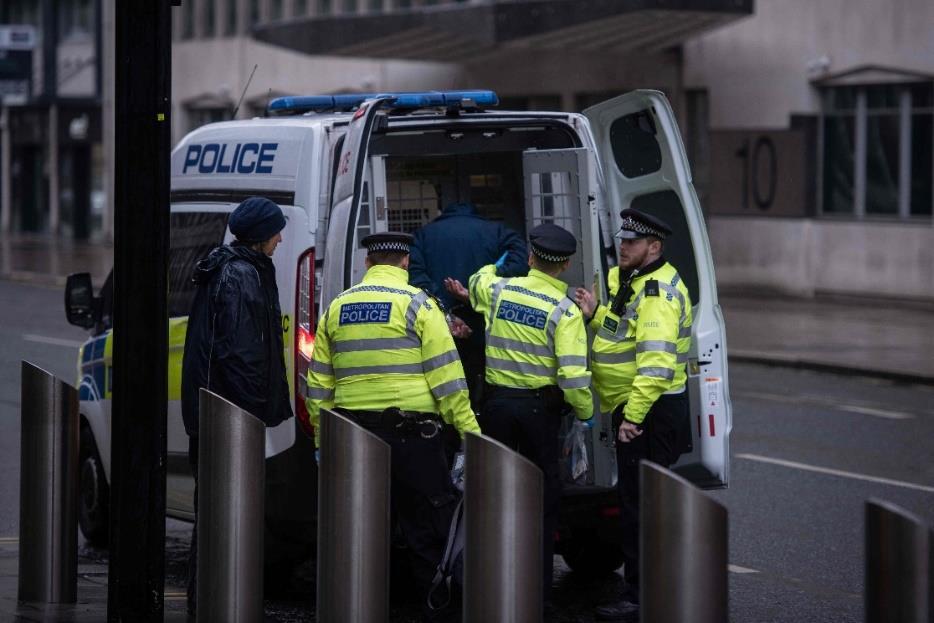Legalities
The Cut the Ties campaign has been prominent in London and as a result the police recognise and react to our actions swiftly. Although it is not definitely the case you should be aware that rebels have been arrested on Cut the Ties actions for the crime of “coming equipped to cause criminal damage” and picked up for carrying stickers whilst walking with rebels carrying fire extinguishers. All charges were subsequently dropped but it is worth being aware of this possibility when planning your action.
- Anyone doing actions should have completed Non Violent Direct Action (NVDA) training and Know Your Rights (KYR) training. Both are regularly hosted online, and you can find out how to register via the links above.
- All groups taking action that could potentially result in police involvement should read the guidance from XR Arrestee & Legal Support, and request a legal briefing from xr-legal@riseup.net.
Should rebels be arrested during your action the table below outlines the types of charge you could be facing and the possible sentence.
| Behaviour | Location | Potentially relevant legal issues |
|---|---|---|
| Assembling, occupying, being present | Public spaces where protest conditions are in place | Sections 12 and 14 (Protest conditions) |
| Obstructing / occupying / squatting ('die-ins', swarming etc). | Public roads, pavements, verges | Obstruction of the Highway; Public Nuisance |
| Obstructing / occupying / squatting ('die-ins', swarming etc) | Private roads / private property (e.g. shops, banks, etc) | (Civil) Trespass; Aggravated Trespass; (Civil) Private nuisance |
| Setting up stalls and distributing leaflets (but no commercial activities or littering) | Public spaces | Obstruction of the Highway |
| Banner drops | Buildings/street railings etc | Criminal Damage; Aggravated Criminal Damage |
| Spray painting / chalk spraying | Public or private property | Criminal Damage |
| Damaging windows (including by sticking things on them) | Public or private property | Criminal Damage |
| Being present (in any role, including banner holding, leafleting or livestreaming) when an action is carried out, especially criminal damage actions | Public or private spaces | Same offence as the “arrestable” activists under Joint Enterprise |
| Flyposting (even using water-soluble paste) | Private or public spaces (e.g. windows, bus shelters, etc). | Flyposting offences; Criminal Damage |
| Flyposting (even using water-soluble paste) | Near/on roads | See Banners and Roads - Legal Support Briefing |
| Leaving behind objects | Public land, or private land which is accessible to the public | Littering; Fly-tipping |
| Blocking entry to doors | Private land (e.g. inside a shop or bank / outside shop or bank) | Aggravated Trespass |
| Subvertising | Existing advertising spaces | Criminal Damage; Flyposting offences |
| Playing loud music / samba bands etc. | Public spaces | Public Nuisance; Breach of copyright; (Civil) Private Nuisance Bye-laws/location-specific restrictions |
| Use of fire / flammable objects (e.g. flares) | Public or private property | ● Criminal Damage; Aggravated Criminal Damage; ● Arson; Section 80 of the Explosives Act - see Uncommon Forms of Protest - Legal Support Briefing ● Section 22a of the Road Traffic Act - see Banners and Roads - Legal Support Briefing |
| Locking on / gluing on | Public land (including roads, pavements etc) | ● Locking on ● Criminal Damage ● Obstruction of the Highway |
| Locking on / gluing on | Private land | ● Locking on ● Criminal Damage ● (Civil) Trespass ● Aggravated Trespass |
| Having lock on equipment or any item intended to be used for locking on | Public land; private land other than a dwelling | Being equipped to lock on |
| Any behaviour (scaling, painting, banner drops) which has the potential to injure someone else (e.g. falling objects etc) | Private or public land | ● Aggravated Criminal Damage |
| Any behaviour that the police deem is obstructing them in their lawful duty | Private or public spaces | ● Obstruction of a Police Officer |
| Chanting/shouting/communicating (e.g. via banner/signs) messages which others could find threatening | Private / public spaces | ● Breach of the peace; Affray; Violent Disorder |
| Obstructing a work place, such as a construction or drill site, and preventing people from working | Public Land | ● Obstruction of the highway ● Section 241 of Trade Union and Labour Relations Act |

